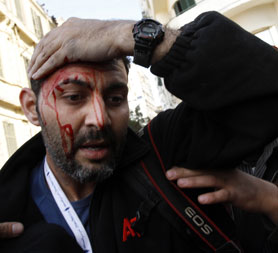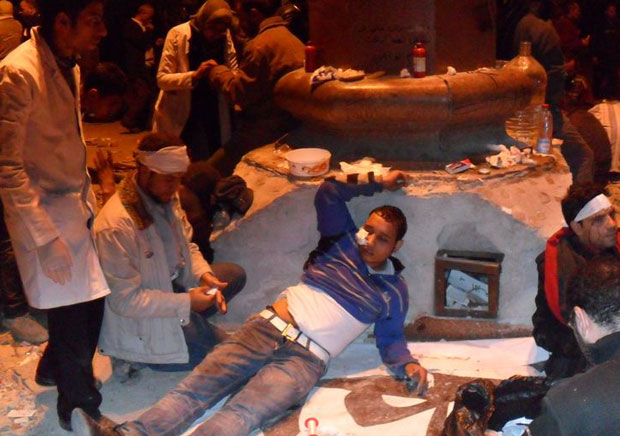Egypt: field hospitals treat Cairo wounded as violence rages
Field hospitals have been set up in Cairo to treat the wounded from bloody clashes in Tahrir Square. Channel 4 News speaks to a volunteer prevented from delivering medical supplies by “armed thugs”.

Clashes continued in central Cairo on Thursday after supporters of President Hosni Mubarak clashed with anti-government protesters demanding an end to the regime’s 30-year rule.
At least six people have been killed after a bloody confrontation broke out in the capital on Wednesday.
Unconfirmed reports have suggested hospitals have received up to 30 dead protesters.
Reports have suggested that some hospitals in Cairo are suffering blood donor shortages as they try to treat those wounded in the ongoing violence.
Makeshift field hospitals have been set up to treat the wounded on the streets surrounding Tahrir Square which has become the focus of clashes in the capital.
Pictures have emerged of people with severe head and body injures being stitched up by volunteers. Others appear to show people with teeth knocked out, bloodied eyes and hand injuries.
Volunteers, many with no apparent medical experience, have been treating minor injures on the streets.
Supplies shortage
One protester – whose identity has been protected for security reasons – told Channel 4 News he had helped escort injured people to field hospitals from across Cairo.
On Thursday he tried to enter Tahrir Square with medical supplies but was driven away by a “band of thugs armed with chains”.
“I have taken injured people and people unconscious from tear gas to these street hospitals,” the protester told Channel 4 News.
“I’ve been involved in the protests since Friday and everyone is doing what they can – people are making do where they can.”
One aid worker in contact with people working at the Tahrir medical centre told Channel 4 News doctors were also struggling to source medical equipment to deal with the influx of injured people.
Online activists circulated a list of medical equipment and urged others to help those hurt.
According to a doctor on the scene in Cairo up to ten people have been killed in Tahrir Square, a doctor at makeshift clinic treating the casualties said on Thursday.
Dr Sayyid Hussein said the makeshift clinic, operating out of a mosque near the square, had registered 10 deaths.
“An hour an a half ago, two people were rushed to me with gunshot wounds to the head. They were gasping and died. A third case followed, which was very severe, but that case was taken to hospital by ambulance,” said another doctor, Yasser Tibi, at a field station of the makeshift clinic.
Deaths rise
The number of people killed since violence erupted across Egypt last week continues to rise.
Demonstrator Ahmed Ahab, who Channel 4 News reported on Wednesday was receiving treatment in hospital after being shot in the head during Friday’s protest, has died in Cairo.
A friend of the 29-year-old told Channel 4 News he had died after being in a coma for over five days.
Doctors discovered that Ahmed Ahab had been killed by a live round, and not a rubber bullet as originally thought, Channel 4 News understands.

Photo: Jim Lundberg
Media and NGO attacks
On Thursday a worker with Amnesty International was arrested after police took over the Hisham Mubarak Law Centre.
A delegate from Human Rights Watch and a number of other workers were taken to an unknown location in Cairo, Amnesty told Channel 4 News.
At the time of writing their current location is unknown. Amnesty International Secretary General Salil Shetty called for their release.
“We call for the immediate and safe release of our colleagues and others with them who should be able to monitor the human rights situation in Egypt at this crucial time without fear of harassment or detention.”
A number of foreign journalists have reported being beaten and arrested as they attempted to report on clashes in the capital.
The US State Department condemned what it called a “concerted campaign to intimidate international journalists in Cairo and interfere with their reporting.”
Al Arabiya television reported that Mubarak supporters had stormed hotels, chasing foreign journalists.
United Nations Secretary-General Ban Ki-moon called for restraint in Egypt on Thursday and said the transition of power should start now.
Asked about reports of harassment of reporters, Ban said: “The freedom of speech, whether (of) peaceful demonstrators or journalists, should be fully guaranteed and protected. The government should listen very attentively to the wishes of the people.”